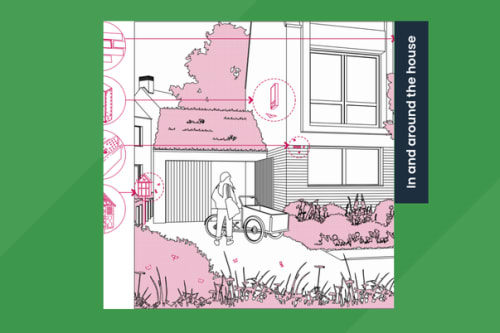I can’t talk to anyone in planning about what I need to do. I don’t need another expensive assessment and all the back and forth. I just want someone to set out what I need to do.
The Government has introduced biodiversity net gain (BNG) as a requirement for planning permission for new development in England. Developers must demonstrate that their development increases biodiversity by at least 10% and local authorities are permitted to increase this requirement in their local plans.
BNG became mandatory for large sites on 12 February 2024, and for small sites on 2 April 2024. All planning applications submitted will now need to comply with BNG unless exempt, and the criteria for exemption are very narrow. Achieving the 10% uplift in BNG requires a comprehensive understanding of habitat creation and enhancement, legal requirements, and the use of the Biodiversity Metric. For most projects, expert ecology advice will be needed to assess the site by classifying and measuring the habitats present. The ecologist will calculate the biodiversity value before (baseline survey) and after development using the biodiversity metrics and standardised reporting template provided by the government.
A biodiversity gain plan - a document that explains how a project follows the mitigation hierarchy and achieves BNG – is then prepared and agreed before site work commences through the planning condition discharge process.
The developer then needs to deliver the agreed habitat improvements before completion or handover and continue to maintain the habitat for a minimum of 30 years.
The Government has been criticised by the National Audit Office (NAO) for implementing the requirements hastily and without proper consideration of how its effectiveness will be monitored. The NAO also doubts that local authorities will have the resources to implement the scheme and that, in general, there aren’t enough ecologists to undertake assessment work and review proposals on behalf of local authorities. Criticisms have also been made regarding the lack of enhancement schemes through which offsite credits can be traded.
For a small development, the cost of advice and completing the necessary reports and plans could easily be several thousands of pounds in addition to the cost of the improvement measures themselves.
Built projects will potentially benefit over time from the requirement to maintain habitats but the mechanisms for delivering this have not been tested and as the scheme has only come into force this year there are uncertainties for small developers. Resources are available online to help explain the metrics and process but at the time of this note there are very few case studies with practical guidance.
Things that can go wrong:
- The planning application process can be delayed with potential additional costs if BNG is not considered from the outset;
- Although BNG is a habitat-based approach, it can go alongside nature boxes for roosting and nesting. However, the siting of these is important in order to maximise the opportunities for wildlife and the benefits to the homeowner.
Future-proofing recommendations:
- DESIGN: Obtain good advice from competent people at the outset of a project and ensure the baseline study and reports are in the right format for planning;
- DESIGN: The Future Homes Hub biodiversity workstream is developing guidance, information and tools to help developers integrate biodiversity in the transition to creating wildlife friendly communities.
Further Reading
Biodiversity in new housing developments: creating wildlife-friendly communities
Biodiversity in new housing developments: creating wildlife-friendly communities is a report commissioned by the NHBC Foundation, with the support of the RSPB and Barratt Developments. It demonstrates how the house-building industry is uniquely placed in having an opportunity to create not just houses, but sustainable communities, where people thrive alongside wildlife.
Implementing statutory biodiversity net gain
This report examines the progress Defra and Natural England have made in implementing statutory BNG, and whether they have done so in a way that maximises benefits and effectively manages risks.
Future Homes Hub: Biodiversity
The Future Homes Hub (FHH) project aims to help developers with guidance, information and tools to implement BNG successfully and seamlessly as part of designing and planning sites. The FHH is working with partners who represent the many facets of BNG, to help provide the necessary support and overcome barriers.
Report Chapters
Explore NHBC Foundation

About NHBC Foundation research
Delivering high-quality research and guidance to help the house-building industry address the challenges of delivering 21st-century new homes.

Access NHBC Foundation publications
Access and download NHBC Foundation’s full portfolio of publications and practical guides, covering primary research, research reviews and documents informing the debate.

Latest NHBC Foundation news
View the latest NHBC Foundation news, articles and facts showcasing the most recent publications and reporting on progress with new research projects.
Technical disclaimer
The information provided or contained on this website has been produced by NHBC for research and guidance purposes through the “NHBC Foundation”. It has not been created or intended for distribution or use outside of the purpose for which it was drafted. The information contained on this website does not constitute advice and is not to be relied upon by any third party. Any third party who chooses to rely upon the information contained on this website shall do so entirely at their own risk and NHBC accepts no duty of care or liability, however caused, in connection with its use or reliance by any third party. It is not updated or maintained.
This website may contain links to websites operated by third parties. Third party websites are not under our control, and we are not responsible for the content of any third-party website, or any link contained in a third-party website. NHBC do not review, approve, monitor, endorse, warrant, or make any representations with respect to third party websites. Any third party who chooses to rely upon the information contained on a third-party website shall do so entirely at their own risk. NHBC accepts no duty of care or liability, however caused, in connection with its use or reliance by any third party.
